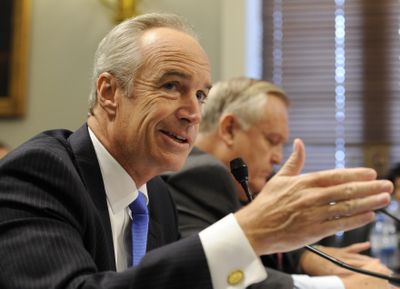Interior officials lambasted over oil scandal
Offending agency has been taken to task, Kempthorne says

WASHINGTON – Legislators excoriated top Interior Department officials Thursday at a hearing on the sex, drugs and gifts scandal in the oil royalties program, saying such behavior could have dire ramifications on the anticipated expansion of offshore drilling along the U.S. coasts.
The hearing before the House Committee on Natural Resources came a week after the department’s inspector general, Earl Devaney, released three separate reports alleging that employees of the program helped to rig bids, accepted gifts from energy company officials, had sex with subordinates and industry contacts, and used illegal drugs, including marijuana and cocaine.
Also at issue was a Government Accountability Office investigation, also released last week, which found that because of decreased oversight and widespread inaccuracies in measurement, the Interior Department may not be collecting all the royalties owed by energy companies for the oil and natural gas they draw from federal property.
“These are serious issues,” said Rep. Nick Rahall, D-W.Va., the committee chairman. “But they are more serious now as we face the certain prospect that vast swaths of federal waters will become open to oil and gas leasing in the very near future.”
In his testimony, Interior Secretary Dirk Kempthorne professed his outrage and disgust with the actions of more than a dozen current and former employees. Among the steps already taken, he said, are the prosecution of two employees, the transfer of others and the planned appointment of an attorney-adviser to ensure ethics compliance.
He also is considering implementing a random drug-testing program, prohibiting all employees in the oil royalties division from receiving gifts and gratuities, and firing eight individuals who still work for the department.
The Interior Department collects more than $8 billion a year in royalties from energy companies that lease federal land. That money represents the government’s largest source of revenue excluding taxes.
Devaney’s reports are the latest to question the close relationship between the energy industry and the Minerals Management Service, the Interior Department agency that issues drilling leases to energy companies on taxpayer-owned land and then collects royalties from those leases.
The reports detailed “a culture of substance abuse and promiscuity” from 2002 to 2006 at a Denver-based division of the Minerals Management Service. That office deals specifically with Royalty in Kind payments, or payments made to the government in the form of oil instead of cash.
At Thursday’s hearing, Devaney called the employees’ actions “egregious,” but stressed that the workers represented a very small minority.
“I reiterate my belief that 99.9 percent of DOI employees are ethical, hard-working and well-intentioned,” Devaney said. “Unfortunately, the conduct of a few does cast a pall over the whole, at least for a time.”
As for the energy company representatives who allegedly gave gifts to, and had sexual relationships with, the government employees, Devaney stated that he was “at a loss to explain” their behavior.
According to current rules, federal employees are not allowed to accept individual gifts worth more than $20 and can accept no more than $50 worth of gifts each year. Nine employees targeted by the investigation allegedly accepted drinks and meals, golf trips, snowboarding lessons, hotel rooms and baseball and concert tickets. The four companies identified in the reports were Shell Oil Co., Hess Corp., Chevron Corp. and Gary-Williams Energy Corp.